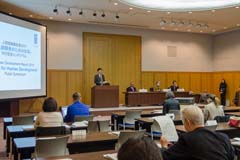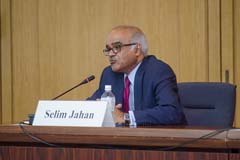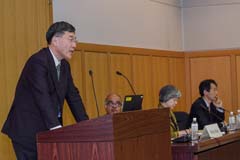JICA-RI and UNDP Discuss 2015 Human Development Report and 'Work'
2016.03.29
JICA-RI and the United Nations Development Programme held a symposium on March 14, 2016 at JICA Ichigaya Building in Tokyo to celebrate the release of the UNDP's 2015 Human Development Report and discuss its theme: work for human development.
Selim Jahan, director of the UNDP's Human Development Report Office, made the keynote speech at the event. Following the keynote speech, JICA-RI visiting scholar Go Shimada, assistant professor of economics of the School of International Relations, the University of Shizuoka, and Akiko Taguchi, director of the International Labour Organization (ILO) Office for Japan, gave short comments on the report. JICA-RI Director Ichiro Tambo closed the meeting by highlighting the importance of work that goes unmeasured by GDP.

Tetsuo Kondo, the director of the UNDP Representative Office in Japan, gives his opening remarks
In opening remarks, Tetsuo Kondo, the director of the UNDP Representative Office in Japan, said the year 2015 is a watershed year since the 2030 Agenda for Sustainable Development and Sustainable Development Goals were adopted. He said it's been 25 years since the first Human Development Report was issued with the simple notion that development is about enlarging people's choice.
Jahan gave an overview of the report's content, discussing its five basic messages in his keynote address:
Jahan noted that in order to accelerate the progress achieved so far in human development - including more than 1 billion people escaping extreme poverty in the past 25 years - as well as to overcome the gaps - including ongoing poverty, suffering and unused human potential - a positive link must be forged between work and human development. He pointed out that sustainable work is work that enhances human development and ensures environmental sustainability.
Shimada said Kaizen can be discussed as one way of translating the Human Development Report into action and presented his research findings on a Kaizen project.

Selim Jahan, the director of the UNDP's Human Development Report Office, makes the keynote speech.
He talked about preliminary findings of JICA-RI's research on a JICA Kaizen project at 98 companies in eight countries: Guatemala, Belize, Honduras, El Salvador, Nicaragua, Panama, the Dominican Republic and Costa Rica. Based on surveys of management and workers, he found that kaizen succeeded in the three goals of expanding employment, increasing cooperation between labor and management and fairly distributing the fruits of productivity.
"Therefore I would like to suggest we introduce kaizen to achieve 'quality of work' in developing countries," he concluded.
Another invited commentator, Akiko Taguchi, praised the Report for its comprehensiveness and touched on an approach to gender imbalances.
JICA-RI Director Ichiro Tambo said in his closing remarks, "The groundbreaking point of this report is how it defines work in a broader scope that encompasses jobs and employment, including unpaid domestic work, voluntary work and creative work, all of which cannot be measured by GDP or any other economic indicators."

JICA-RI Director Ichiro Tambo delivers his closing remarks
He also stressed the importance of "quality growth" and "human security" and said that JICA-RI has undertaken new research to better understand quality growth.
Interview with Selim Jahan, director of HDR Office, UNDP (JICA-RI Official Channel)
"Human Development Report 2015 - Work for Human Development" by Selim Jahan (Mar. 14, 2016) (JICA-RI Official Channel)

事業事前評価表(地球規模課題対応国際科学技術協力(SATREPS)).国際協力機構 地球環境部 . 防災第一チーム. 1.案件名.国 名: フィリピン共和国.

事業事前評価表(地球規模課題対応国際科学技術協力(SATREPS)).国際協力機構 地球環境部 . 防災第一チーム. 1.案件名.国 名: フィリピン共和国.

事業事前評価表(地球規模課題対応国際科学技術協力(SATREPS)).国際協力機構 地球環境部 . 防災第一チーム. 1.案件名.国 名: フィリピン共和国.

事業事前評価表(地球規模課題対応国際科学技術協力(SATREPS)).国際協力機構 地球環境部 . 防災第一チーム. 1.案件名.国 名: フィリピン共和国.

事業事前評価表(地球規模課題対応国際科学技術協力(SATREPS)).国際協力機構 地球環境部 . 防災第一チーム. 1.案件名.国 名: フィリピン共和国.
scroll